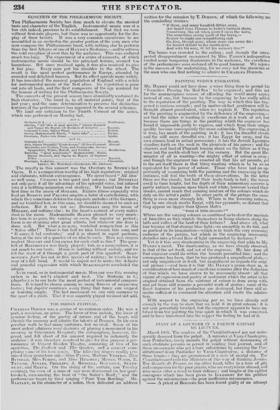CONCERTS OF THE PHILHARMONIC SOCIETY.
THE Philharmonic Society has done much to elevate the musical taste and character of the English. Instrumental music was at a low ebb indeed, previous to its establishment. Not that we were without first-rate players, but there was no opportunity for the dis- play of their talents. It was a very common occurrence to see assembled in an orchestra the greater portion of the very men who now compose the Philharmonic band, with nothing else to perform than the first Allegro of one of HAYDN'S Sinfonias,—and to witness the cold reception of even this by the audience. This was endured much too long. The experiment of a series of concerts, of which instrumental music should be the principal feature, seemed too hazardous. But once resolved upon, it was also resolved to give it fair play. Every man put his shoulder to the wheel. The i result s the most perfect performance in Europe, attended by crowded and delighted hearers. But its effeet spreads more widely. It has inoculated the musical population of England with a relish for instrumental music of the first class. Its reputation is gone out into all lands, and the first composers of the age contend for the honour of writing for the Philharmonic Society.
, The concerts of the present season have abundantly sustained its high character. The band is, in all material points, that of the last year ; and the same determination to preserve the distinctive features of the performances has appeared in the several schemes. We limit our criticism to the Fourth Concert of the series, which was performed on Monday last.
ACT 1. Sinfonia in A .... ................. Beethoven. Duetto, "All' idea di gnat metallo," Signor lionzeni and Signor De Begnis (11 Betrbiece ill Se Rossini. concerto Como, Signor Puzzi Belloli.
Scena, Mademoiselle Blade, " Salvo alibi" Overture, Pietro von Abanc . Spohr.
ACT II. Sinfoniain C ...... ............ ........... ....... . Mozart. Aria, Signor Donzelli," II inio tesoro" (II Don Gionanni) Mozart. Quartetto, two Violins, Viola, and Violoncello, Messrs. Spagnoletti, Watts, Month, and Lindley Beethoven. Terzetto, " Quel setnbiante," Mademoiselle Blasis, Signor Donzelli, and Signor de Begnis (L' Ingunno Felice •
Overture, Lodoiska Cherubini. Leader, Mr. Weichsel—Conductor, Mr. Attwoud.
The novelty in this concert was the Overture to SPOHR'S last Opera. It is a composition worthy of his high reputation: original and elaborate, without extravagance. We never heard "All idea" so well sung. CURIONI is too quiet and solemn ; but DONZELLI not only gave it all the advantage of his splendid voice, but infused into it a befitting animation and drollery. We heard him for the first time in the music of MOZART. Italians (those especially who feed on Rossi's' and PAC I NO acquire a habit of embellishing, with which they sometimes deform the exquisite melodies of the German ; and we trembled lest, in this case, we should be doomed to such an infliction. But it was not so : DONZELLI sang the music of MOZART, and nothing else ; to the heart's content of every indivi- dual in the room. Mademoiselle BLASIS pleased us very much : her tone is so pure, the voicing so even, the register so perfect.; there is no straining after great effects, but whatever she does is done well. . But what a meagre, wretched composition is this " Salvo affin!" There is but half an idea between this song and " II soave il bel content° ;" and it is shared in equal portions, beino, at the rate of a quarter of an idea to each. How can singers neglect 11I 07, A RI' and CIMAROSA fur such stuff as this ? The guar- tett Of BEETHOVEN was finely played ; but, as a composition, it is not much to our taste. Music is nothing without melody, and we felt, the want of it through a great part of this quartett. BEET- HOVEN'S foile lies not in this species of writing; he revels in the roar of a full band. It would be unjust not to notice the delicate amid graceful expression with which SPAGNOLEM concluded the adagio.
As in vocal, so in instrumental ITHIStie, MOZART was this evening (when is he hot?) chiefest and best. The Sinfonia in C-, (Jupiter.) is to our taste the most perfect of instrumental composi- tions. It is hard to choose among so many flowers of surpassing lustre ; but Jupiter combines every thing that fancy can suggest or learning supply. The last movement we can only compare to the sport of a giant. That it was superbly played we need not add.


















 Previous page
Previous page